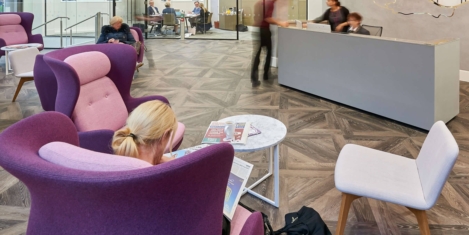To provide the best experiences, we use technologies like cookies to store and/or access device information. Consenting to these technologies will allow us to process data such as browsing behaviour or unique IDs on this site. Not consenting or withdrawing consent, may adversely affect certain features and functions.
The technical storage or access is strictly necessary for the legitimate purpose of enabling the use of a specific service explicitly requested by the subscriber or user, or for the sole purpose of carrying out the transmission of a communication over an electronic communications network.
The technical storage or access is necessary for the legitimate purpose of storing preferences that are not requested by the subscriber or user.
The technical storage or access that is used exclusively for statistical purposes.
The technical storage or access that is used exclusively for anonymous statistical purposes. Without a subpoena, voluntary compliance on the part of your Internet Service Provider, or additional records from a third party, information stored or retrieved for this purpose alone cannot usually be used to identify you.
The technical storage or access is required to create user profiles to send advertising, or to track the user on a website or across several websites for similar marketing purposes.
 There’s no question what has occupied the majority of attention for risk managers during 2020. But Healix International, believes the all-consuming consequences of the pandemic could leave governments and employers exposed to other risks in 2021. (more…)
There’s no question what has occupied the majority of attention for risk managers during 2020. But Healix International, believes the all-consuming consequences of the pandemic could leave governments and employers exposed to other risks in 2021. (more…)








 A new think tank has launched today to mark the United Nations’ International Day of Persons with a Disability. Called ‘
A new think tank has launched today to mark the United Nations’ International Day of Persons with a Disability. Called ‘
 Most of the analysis about the effects of the 2020 pandemic on people’s working lives has tended to involve grand statements about new normals and the death of this or that, as if everybody wants the same things, has the same personal circumstances, works in the same ways, the same places and same sectors.
Most of the analysis about the effects of the 2020 pandemic on people’s working lives has tended to involve grand statements about new normals and the death of this or that, as if everybody wants the same things, has the same personal circumstances, works in the same ways, the same places and same sectors. 
 The repercussions of Covid-19 for the small business community have been particularly ruinous. Recent figures paint a worrying picture, revealing that approximately 76,300 SMEs in London alone ceased operations completely as a direct result of the pandemic, with lockdowns costing from £30,000 to £75,000 for one in ten small businesses. As the most vulnerable business segment in the current crisis, SMEs needed the biggest support and, by the end of April, had already received over £4 billion via the government’s
The repercussions of Covid-19 for the small business community have been particularly ruinous. Recent figures paint a worrying picture, revealing that approximately 76,300 SMEs in London alone ceased operations completely as a direct result of the pandemic, with lockdowns costing from £30,000 to £75,000 for one in ten small businesses. As the most vulnerable business segment in the current crisis, SMEs needed the biggest support and, by the end of April, had already received over £4 billion via the government’s 
 The
The 
 A new study on work-life balance claims that the COVID-19 crisis is a crucial factor – but not the only one – behind low levels of wellbeing among employees working from home. A research team including Professor Ilke Inceoglu, Professor of Organisational Behaviour and HR Management at the
A new study on work-life balance claims that the COVID-19 crisis is a crucial factor – but not the only one – behind low levels of wellbeing among employees working from home. A research team including Professor Ilke Inceoglu, Professor of Organisational Behaviour and HR Management at the 
 Despite the last-minute extension of the furlough scheme, new research conducted among UK business leaders claims that great concern remains around making redundancies and in particular the legal risk. The survey of over 440 UK business leaders, conducted by employment law and HR support firm
Despite the last-minute extension of the furlough scheme, new research conducted among UK business leaders claims that great concern remains around making redundancies and in particular the legal risk. The survey of over 440 UK business leaders, conducted by employment law and HR support firm 
 The construction of new offices in central London has declined by half (50 percent) in six months as developers and occupiers shift their focus to refurbishment, according to Deloitte Real Estate’s latest
The construction of new offices in central London has declined by half (50 percent) in six months as developers and occupiers shift their focus to refurbishment, according to Deloitte Real Estate’s latest 
 Employees facing increased job and financial insecurity at the onset of the pandemic suffered a wave of mental distress, according to research published by the
Employees facing increased job and financial insecurity at the onset of the pandemic suffered a wave of mental distress, according to research published by the 
 The construction sector, the real estate industry and city planners must give high priority to the same goal – to drastically reduce their climate impacts. Powerful, combined efforts across all of the built environment sectors are absolutely crucial for the potential to achieve the UN’s sustainability goals. And what’s more – everything has to happen very quickly. These are the cornerstones to a roadmap presented at the recent
The construction sector, the real estate industry and city planners must give high priority to the same goal – to drastically reduce their climate impacts. Powerful, combined efforts across all of the built environment sectors are absolutely crucial for the potential to achieve the UN’s sustainability goals. And what’s more – everything has to happen very quickly. These are the cornerstones to a roadmap presented at the recent 
 In times of economic stability, entrepreneurs who exude self-confidence are the most likely to thrive. However, when faced with unstable and adverse economic conditions, those entrepreneurs who possess greater resilience are most likely to come out on top, according to new research from
In times of economic stability, entrepreneurs who exude self-confidence are the most likely to thrive. However, when faced with unstable and adverse economic conditions, those entrepreneurs who possess greater resilience are most likely to come out on top, according to new research from 








December 3, 2020
Hybrid working presents us with a once in a generation opportunity
by Michael Cockburn • Comment, Coworking, Flexible working, Technology